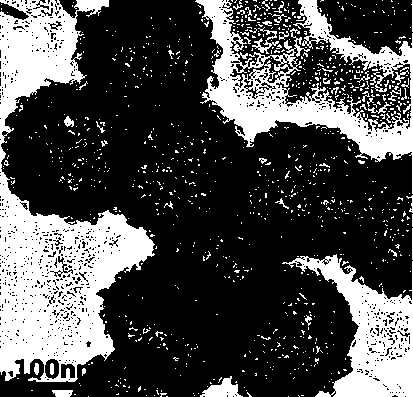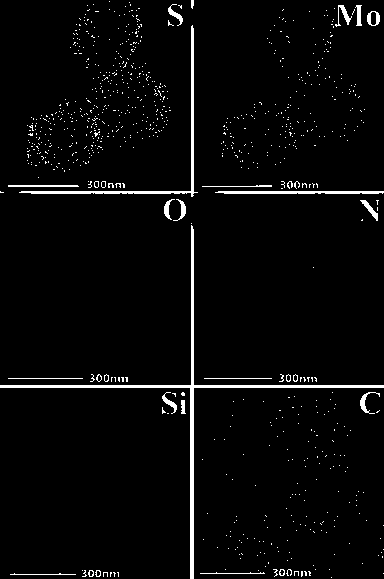Hollow sandwiched SiO2/C/MoS2 hybridized microsphere for lithium ion battery anode material
A technology of lithium-ion batteries and hybrid microspheres, applied in battery electrodes, secondary batteries, electrochemical generators, etc., to achieve the effect of increasing specific capacity and energy density
- Summary
- Abstract
- Description
- Claims
- Application Information
AI Technical Summary
Problems solved by technology
Method used
Image
Examples
Embodiment 1
[0032] 1) Preparation of PS template microspheres: Add 11 mL of St and 70 mL of deionized water into a 250 mL round bottom flask equipped with mechanical stirring, stir for 30 min under high-purity nitrogen, heat to 70 °C, and then add 15 mL of 0.1 g KPS Deionized aqueous solution was used as an initiator, and PS microspheres with a diameter of about 230nm were obtained by stirring at 70°C for 12h.
[0033] 2) PS / SiO2 2 Preparation of hybrid microspheres: In a 250 mL round bottom flask, ultrasonically disperse 2 g of PS microspheres prepared in step 1) in 160 mL of ethanol, then add 1.5 mL of TEOS and stir for 30 min, heat the solution to 40 °C, and then add 20mL of ammonia water was stirred continuously for 12h with mechanical stirring to hydrolyze TEOS and self-assemble on the surface of microspheres to obtain PS / SiO 2 hybrid microspheres.
[0034] 3) PS / SiO2 2 / PDA hybrid microspheres: take 0.5 g of PS / SiO prepared in step 2) 2 The hybrid microspheres were ultrasonicall...
Embodiment 2
[0039] 1) Preparation of PS template microspheres: according to Example 1.
[0040] 2) PS / SiO2 2 Preparation of hybrid microspheres: In a 250 mL round bottom flask, 2 g of PS microspheres prepared in step 1) were ultrasonically dispersed in 160 mL of ethanol, then 1.0 mL of TEOS was added and stirred for 30 min, the solution was heated to 40 °C, and then added 20mL of ammonia water was stirred continuously for 12h with mechanical stirring to hydrolyze TEOS and self-assemble on the surface of microspheres to obtain PS / SiO 2 hybrid microspheres.
[0041] 3) PS / SiO2 2 Preparation of / PDA hybrid microspheres: according to Example 1.
[0042] 4) PS / SiO2 2 / PDA / MoS 2 Preparation of hybrid microspheres: according to Example 1.
[0043] 5) SiO2 2 / C / MoS 2 Preparation of hybrid microspheres: according to Example 1.
Embodiment 3
[0045] 1) Preparation of PS template microspheres: according to Example 1.
[0046] 2) PS / SiO2 2 Preparation of hybrid microspheres: according to Example 1.
[0047] 3) PS / SiO2 2 / PDA hybrid microspheres: take 0.5 g of PS / SiO prepared in step 2) 2 The hybrid microspheres were ultrasonically dispersed in 400 mL of a mixed solvent with a volume ratio of ethanol: water = 7: 1, 0.15 g Tris and 0.45 g DA were added, and mixed and stirred for 24 h at room temperature. DA was mixed in PS / SiO 2 Polymerization on the surface of microspheres to obtain PS / SiO 2 / PDA hybrid microspheres.
[0048] 4) PS / SiO2 2 / PDA / MoS 2 Preparation of hybrid microspheres: according to Example 1.
[0049] 5) SiO2 2 / C / MoS 2 Preparation of hybrid microspheres: according to Example 1.
PUM
| Property | Measurement | Unit |
|---|---|---|
| Size | aaaaa | aaaaa |
| Diameter | aaaaa | aaaaa |
| Thickness | aaaaa | aaaaa |
Abstract
Description
Claims
Application Information
 Login to View More
Login to View More - R&D Engineer
- R&D Manager
- IP Professional
- Industry Leading Data Capabilities
- Powerful AI technology
- Patent DNA Extraction
Browse by: Latest US Patents, China's latest patents, Technical Efficacy Thesaurus, Application Domain, Technology Topic, Popular Technical Reports.
© 2024 PatSnap. All rights reserved.Legal|Privacy policy|Modern Slavery Act Transparency Statement|Sitemap|About US| Contact US: help@patsnap.com










